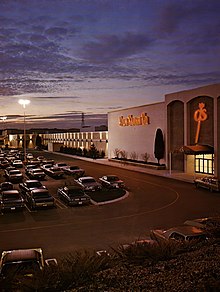
The F. W. Woolworth Company was a retail company and one of the pioneers of the five-and-dime store. It was among the most successful American and international five-and-dime businesses, setting trends and creating the modern retail model that stores follow worldwide today.
Antioch is a neighborhood of Nashville located approximately 12 miles (19 km) southeast of Downtown Nashville. It is served by the Metropolitan Government of Nashville and Davidson County.
S. H. Kress & Co. was the trading name of a chain of five and dime retail department stores in the United States established by Samuel Henry Kress. It operated from 1896 to 1981. In the first half of the 20th century, there were Kress stores with ornamented architecture in hundreds of cities and towns.

Dillard's, Inc. is an American department store chain with approximately 267 stores in 29 states and headquartered in Little Rock, Arkansas. Currently, the largest number of stores are located in Texas with 57 and Florida with 42. The company also has stores in 27 more states; however, it is absent from the Northeast, most of the Upper Midwest, and most of the West Coast, aside from three stores in California.

Madison is a former settlement, now a suburban neighborhood of northeast Nashville, in the U.S. state of Tennessee. It is incorporated as part of the Metropolitan Government of Nashville and Davidson County.

The Greensboro sit-ins were a series of nonviolent protests in February to July 1960, primarily in the Woolworth store — now the International Civil Rights Center and Museum — in Greensboro, North Carolina, which led to the F. W. Woolworth Company department store chain removing its policy of racial segregation in the Southern United States. While not the first sit-in of the civil rights movement, the Greensboro sit-ins were an instrumental action, and also the best-known sit-ins of the civil rights movement. They are considered a catalyst to the subsequent sit-in movement, in which 70,000 people participated. This sit-in was a contributing factor in the formation of the Student Nonviolent Coordinating Committee (SNCC).

The Nashville sit-ins, which lasted from February 13 to May 10, 1960, were part of a protest to end racial segregation at lunch counters in downtown Nashville, Tennessee. The sit-in campaign, coordinated by the Nashville Student Movement and the Nashville Christian Leadership Council, was notable for its early success and its emphasis on disciplined nonviolence. It was part of a broader sit-in movement that spread across the southern United States in the wake of the Greensboro sit-ins in North Carolina.
Castner Knott was a Nashville, Tennessee-based regional department store chain which operated stores in Alabama, Kentucky, and Tennessee. The chain was in business for a century from 1898 to 1998, in its later years as a division of Mercantile Stores Company.

Read's Drug Store was a chain of stores based in Baltimore, Maryland. Read's Drug Store was founded by William Read. He sold it to the Nattans family in 1899. The downtown store was constructed in 1934 by Smith & May, Baltimore architects also responsible for the Bank of America building at 10 Light St. In 1929, one company slogan was "Run Right to Reads." Read's was purchased from the Nattans by Rite Aid in 1983.
Allied Stores was a department store chain in the United States. It was founded in the 1930s as part of a general consolidation in the retail sector by B. E. Puckett. See also Associated Dry Goods. It was the successor to Hahn's Department Stores, a holding company founded in 1928. In 1935 Hahn's was reorganized into Allied Stores.
Joske's, founded by German immigrant Julius Joske in 1867, was a department store chain originally based in San Antonio, Texas. In December 1928, Hahn Department Stores acquired the company along with the Titche-Goettinger department store of Dallas, and three years later Hahn became part of Allied Stores. Allied was taken over by Campeau in 1986, and Campeau in turn sold the Joske's chain in 1987 to Dillard's. All Joske's stores were then quickly converted into Dillard's locations.

The Mall at Green Hills, originally Green Hills Village, is a shopping mall located in Nashville, Tennessee, United States. The mall has more than 100 stores and restaurants on two main floors totaling 1,053,000 square feet (97,800 m2). Nordstrom, Dillard's, and Macy's are the anchor stores. The mall is owned and managed by Taubman Centers.

Stones River Town Centre is a partially enclosed regional shopping mall in Murfreesboro, Tennessee, United States. Built in 1992, it was expanded and renovated in the late 2000s. The mall comprises more than fifty stores. The mall is owned and managed by Sterling Organization. The anchor stores are Shoe Carnival, Books-A-Million, Electronic Express, AMC Theatres, Strike & Spare, JCPenney, and Dillard's.

Rivergate Mall is a super-regional shopping mall located in Goodlettsville, Tennessee, United States, just outside of Nashville, the state capital of Tennessee. Opened in October 1971, the mall features 1,129,035 square feet (104,890.8 m2) of gross leasable area, with approximately 80 stores and restaurants, as well as a food court. Rivergate Mall has two anchor stores: Dillard's and JCPenney. There are two vacant anchor stores that were formerly Macy's and Sears. Its original anchor stores were Cain-Sloan, Castner Knott, and JCPenney. The mall sits in the core of a shopping district that is shared by the city of Goodlettsville and the Nashville neighborhood of Madison. This area is colloquially referred to by locals as "Rivergate," after the mall. Rivergate Mall is managed by Hendon Properties.

Hickory Hollow Mall, later Global Mall at the Crossings, was a 1.1 million-square-foot (102,193-square-meter) regional indoor shopping mall in the Nashville neighborhood of Antioch, Tennessee, located just east of I-24 at exit 59 along Bell Road. The shopping center was inaugurated on August 11, 1978, and flourished for three decades, containing 249 stores during its heyday as the largest and highest-grossing mall in Tennessee.

One Bellevue Place is a regional shopping, dining, and entertainment complex in southwestern Nashville, Tennessee, specifically in the Bellevue neighborhood. Opened in 1990 as an enclosed regional shopping mall named Bellevue Center, it had capacity for over 90 stores on two floors totaling 848,545 square feet (78,832.4 m2). The mall itself opened in 1990, began showing signs of decline during the early 2000s recession, and closed in 2008. Two of its three anchor tenants continued to operate beyond the mall's closure, but both would eventually vacate the property as well. The entire structure, including the three adjacent anchor buildings and an outparcel, was demolished in 2015. A new mixed-use complex opened on the site in 2017.
Park Plaza Mall is an enclosed shopping mall located in the Midtown neighborhood of Little Rock, Arkansas. Originally opened in 1960 as Park Plaza Shopping Center, an open-air shopping center, the mall is home to two Dillard's flagship stores and merchants including H&M, Talbots, and Eddie Bauer. The structure contains 545,800 square feet (50,710 m2) of retail space, although Dillard's owns 284,165 square feet (26,399.8 m2) of that area for its flagship stores.
Harveys was a department store chain best known for its original store in downtown Nashville, Tennessee.
Harding Mall was a shopping mall located in suburban Nashville, Tennessee, United States. It was southeast of downtown at the corner of Nolensville Pike US 31A/US 41A and Harding Place in the Paragon Mills neighborhood. Built in 1966, it was demolished in 2005 for a Walmart. Harding Mall is notable for being the first enclosed shopping mall in the state of Tennessee.
John Sloan was an American businessman. He served as the president of Cain-Sloan, a department store in Nashville, Tennessee, from 1937 to 1970, including during the 1960 Nashville sit-ins.











